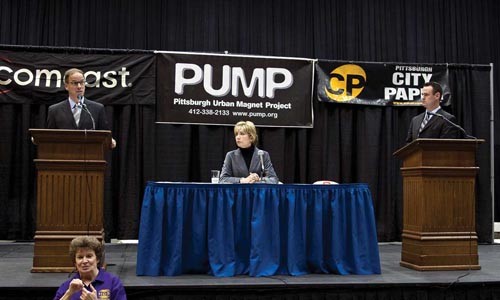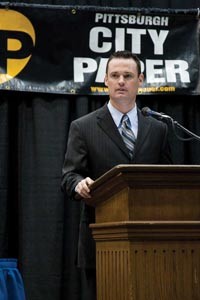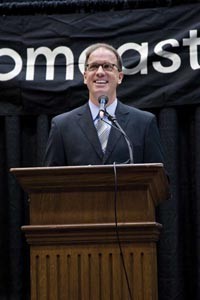It's been a frustrating year for Maria Lupinacci.
For 13 months now, the South Sider, and co-author of the lefty blog 2 political junkies (http://2politicaljunkies.blogspot.com), has watched Mayor Luke Ravenstahl with increasing alarm.
She was bothered by Ravenstahl's midnight flight to New York City with Ron Burkle, the billionaire co-owner of the Penguins. Then came his decision to promote three police officers who'd faced domestic violence in their past. Then came his charity golf outing on the tab of hospital giant UPMC, and news of his seemingly starstruck insistence on meeting golf legend Tiger Woods at the Oakmont Country Club. Most recently, there was the news that Ravenstahl had taken a city-owned SUV -- funded by Homeland Security money -- to a country-music concert.
"The SUV thing is when I said, 'Forget it. This kid is dangerous,'" Lupinacci says. When Ravenstahl, then the president of city council, first assumed the mayor's office after the death of Bob O'Connor, "I didn't think he'd be this bad. I thought he'd be an empty suit, who wouldn't do anything controversial. But now I can't think of a good thing to say about him."
To make matters worse, no Democrat had stood up to Ravenstahl in the special election to fill out O'Connor's term. Lupinacci had supported City Councilor Bill Peduto, but Peduto dropped out before the May primary, citing Ravenstahl's apparent popularity.
So with the Nov. 6 election approach, Lupinacci is doing something she never thought she'd do: voting for the Republican, businessman Mark DeSantis. (Click here to read "The Third Degree," about third-party candidates in this and other city races this November.)
"I have an innate distrust of Republican politicians," she says, "and DeSantis did support Rick Santorum" -- the ousted arch-conservative Pennsylvania senator, to whom DeSantis contributed $400. "I have problems with that. But I still think he's not going to damage our city the way Ravenstahl is."
Not everyone shares Lupinacci's disdain. The Service Employees International Union, one of the most independent and progressive unions in the city, is backing Ravenstahl.. And SEIU Local 585 President Gabe Morgan says more is at work than a typical labor/Democratic alliance: "Our members would like nothing better than for Luke to succeed. I think that's true for most blue-collar folks in Pittsburgh."
But for many other liberal Democrats, the bloom has faded from the 27-year-old Ravenstahl, especially in East End neighborhoods of Shadyside and Squirrel Hill, home base of the city's more socially liberal wing. In the uncontested May primary, the 14th Ward Independent Democratic Club, which represents many active Squirrel Hill Democrats, made no endorsement. (Though president Debbie Levy McKinney says the group "always supports the Democratic slate in the fall.")
Of those disillusioned Dems, however, Lupinacci is one of the few willing to admit her misgivings publicly. Many of the party faithful contacted by City Paper were unwilling to speak on the record. Others say they are simply ambivalent about the choice between Ravenstahl and a Republican.
Things could be worse, Lupinacci acknowledges. His support of Santorum aside, DeSantis is a moderate, pro-choice Republican in the vein of late U.S. Sen. John Heinz, for whom DeSantis worked in Washington. Still, she's not exactly enthusiastic about the coming election.
"One more thing to add to the list of things I don't like about Luke Ravenstahl," she says, "is that he's making me vote for a Republican."
Ravenstahl -- whose office features not one but two large photographs of himself with Tiger Woods -- is unrepentant.
The golf outings, the jaunt to New York, the use of the SUV -- it's all "what I would characterize as overblowing of issues," he says.
As Ravenstahl notes repeatedly in campaign speeches, he took the mayor's office in unusual circumstances. After O'Connor's death, Ravenstahl had to learn a job he never applied for, with a staff he didn't choose. And if he wanted to hold onto that job, he had to campaign for the office even as he tried to master it.
"I've been a candidate since I walked through this door, and with that comes political adversaries and opponents," he adds. But "the city is still running strong." While the scandals have "created a lot of headlines and probably sold a lot of papers and increased ratings at maybe some TV stations," he says, "I think the residents understand that we're doing what we should be doing here. To me, that's all that matters."(Click here to hear Ravenstahl comment on "overblowing issues".)
Indeed, Ravenstahl can point to some promising accomplishments. Sure, his trip to New York City made headlines, in part because it meant he skipped a meeting in the Hill District about plans to build a new Penguins arena. But so far, discussions about the project -- and a Community Benefits Agreement (CBA) to insure the development pays dividends for its neighbors -- have been more open than, say, former Mayor Tom Murphy's efforts to redevelop Downtown retail.
"Luke has been very supportive of the CBA process," says Morgan, of the SEIU, which has been a prominent backer of the negotiations. "That's a great thing -- it sends a message to folks that they are looking for input. A lot of our members live in that area, and it means a lot to them."
Ravenstahl has improved on Murphy's record in another respect as well. Murphy repeatedly sought to balance budgets with revenue from nonexistent taxes, and often denounced Harrisburg even while pleading for aid. So far, Ravenstahl has avoided such public blow-ups: With little fanfare, his 2008 budget was approved by a state-appointed financial oversight panel weeks after it was presented.
"A few years ago," Ravenstahl says, "all there would be was bantering between administrations and city councils and [overseers] about 'this is wrong, that's wrong.' That didn't happen [this time]. And I think that's indicative of the positive working relationship that we have."
If such accomplishments get overlooked, however, Ravenstahl has himself partly to blame. News about his budget, for example, has been overshadowed by his use of the SUV to attend a Toby Keith concert in August. The SUV was purchased with a federal anti-terrorism grant, and is supposed to be used only for anti-terror purposes.
"I didn't know [the SUV] was funded by Homeland Security money," he says flatly. "When I found out ... we immediately stopped using that vehicle. ... Had I [known in advance], certainly I wouldn't have used it. ... Certainly that frustrated me."
And critics, certainly, are frustrated by that defense. It is similar to Ravenstahl's explanation earlier this year for why he promoted three police officers who had faced allegations of domestic abuse. The allegations against one officer, then-sergeant George Trosky, were well publicized, and Ravenstahl says he promoted Troksy anyway, based on his overall service. "The other two were issues I was unaware of until afterwards, and I certainly regret that I was unaware of them."
So far, he says, resolving the issue has also been taken out of his hands. In June, Ravenstahl met with anti-abuse advocates and pledged to work with them on a zero-tolerance policy. But while the city has instituted a citywide background check for new hires and promotions, a comprehensive policy has not been released -- because, Ravenstahl says, women's groups haven't met with him since.
"I've been frustrated that our initial meeting [with anti-abuse activists] has never been followed up on," he says. While another meeting is slated the week this issue hits the stands -- and anti-abuse legislation is being debated in city council -- Ravenstahl says activists have "chosen to take the public forum more so than the private one, through city council post-agendas and public hearings. And as a result of those public conversations, we haven't been able to meet privately." The hearings and debates, he says, have "slowed the process down unnecessarily."(Click here to hear Ravenstahl on why there hasn't been more progress on a domestic-violence policy.)
"It's been up to the mayor's office to give us scheduling," counters Jeanne Clark, a member of the National Organization of Women who has been among the loudest voices calling for reform. "I can tell you that a member of the mayor's staff directly requested that any public action on this be delayed until after the election, and everyone involved refused. I think the mayor needs to look into the mirror for the scheduling problems."
Meanwhile, Republican DeSantis has impressed some of those waiting for results from the incumbent. DeSantis has, for example, won the endorsement of the Gertrude Stein Political Club of Greater Pittsburgh, which advocates for policies and officials that support the gay, lesbian, bi and transgendered communities.
"He had very strong support," says group president Harriet Stein. Among other things, DeSantis supports domestic-partnership benefits for same-sex couples and identifies himself as pro-choice.
DeSantis did oppose needle-exchange programs that reduce the rate of AIDS infection among IV drug users. Stein says that "shocked" her, but adds members "found him to be accessible, intelligent and willing to listen.
"There were concerns about endorsing a Republican," Stein acknowledges. "The group tends to be left-leaning." But Ravenstahl made the choice easier: He didn't respond to the club's questionnaire.
Ravenstahl "wasn't afraid to be involved in [gay pride] festivities, and he doesn't have a problem having his picture taken with prominent gay men at parties," Stein says. "I give him credit for that. But we need someone willing to go on the record with issues."
But more than the support of groups like the Stein club, DeSantis' biggest boost may be from Ravenstahl himself.
As blogger Lupinacci admits, DeSantis is "not a ball of fire as a campaigner"; he often employs a consultant-speak that relies heavily on words like "benchmarking." A key campaign plank, for example, is requiring all senior officials "to sign an annual Pittsburgh Performance Pledge, accepting responsibility for meeting all performance goals."
But while Such ideas may seem wonky, DeSantis' backers say Ravenstahl is making the need for it very clear.
"Transparency in decision-making would be a breath of fresh air," says Charlie Humphrey, the politically outspoken head of the nonprofit Pittsburgh Filmmakers. "I don't feel like I'm ever getting the straight scoop from Ravenstahl."
Humphrey cites a controversial move Ravenstahl made in June, when he asked the directors of 11 city departments and authorities to submit letters of resignation. Saying the "status quo was unacceptable," Ravenstahl said he'd conduct a nationwide job search and decide which resignations to accept. When the process ended in September only two directors were actually discharged. (A third had taken a job elsewhere.)
Behind the scenes, politicos mutter that the episode created friction within and without city government. To many, it seemed capricious, and Ravenstahl had threatened some prominent political names: Parking Authority director David Onorato is the brother of the county executive, while Public Works director Guy Costa is a member of the influential Costa family.
Humphrey says the whole move "was incredibly ham-fisted. I'm glad he's retained the people he has, because there are good people." (Two surviving officials still serve on Filmmakers' board of directors.) "But why put them through it at all?"
Interviewed by City Paper at the time, DeSantis called the move "a train wreck." Directors "have been given no clear directive as to how they're supposed to perform. People's lives are being affected here; it's terrible for morale." If Ravenstahl had retained him as a management consultant, DeSantis said, "It'd be the first time I ever asked my client to resign."
Ravenstahl defends the move, which he says "showed employees that there's a new way to do business. Just because they've worked here for 20 or 25 years and done it that way, doesn't mean it's right."
Still, he admits the changes were less sweeping than one might have expected. Potential applicants, he says, were wary of taking a position under a mayor facing a special election this year, and a re-election bid two years from now. "I don't know that that's my fault; I think it was just a result of the atmosphere and the environment in which the process took place."
*****
Such controversies aside, there's a larger reason for ambivalence about this election: No one thinks DeSantis can be elected.
Even among supporters, "A lot of people say, 'DeSantis doesn't have a chance,'" says Humphrey. (By openly backing DeSantis, he adds, "I'm probably committing political suicide.")
He may have some company. One DeSantis adviser, former county executive Jim Roddey, recently told the Associated Press that numerous Democratic committeepeople were quietly working for DeSantis. Also, right before this issue went to press, DeSantis received the endorsement of the Fraternal Order of Police.
But the line-crossing works both ways: Roddey's old business partner and political supporter, Henry Posner, contributed $10,000 to Ravenstahl's campaign in the most recent reporting period. (Contribution records for DeSantis' campaign are not due until after this issue goes to press.) And DeSantis' crossover support can't compare to what Roddey had during his 1999 county executive race against Democratic stalwart Cyril Wecht. Roddey's backers included Jeanne Caliguiri, widow of the late mayor Richard Caliguiri, and prominent Downtown attorney Daniel Booker.
"We haven't had a lot of those" prominent figures, acknowledges Mike DeVanney, a DeSantis campaign spokesman.
Reached by phone, Booker has a simple explanation for why that is: Even if Dems are "lukewarm for Luke," he says, Republicans are on the short end of a 5-to-1 party-registration advantage. "The Republicans have no chance in this election," he says. While Booker himself once backed Roddey -- and John Heinz, DeSantis' old boss -- he's sticking with the Democrat this time.
"Given that the Democrats are going to win, I think we need to make the best of it," he says. "We need to do everything we can as a community to make a Ravenstahl administration work."
So does Booker's support have less to do with genuine conviction than with bowing to the inevitable? Not at all, he says.
"I think the Ravenstahl administration has yet to prove that they can do an effective job -- but I think the potential is there."
Booker says he'll judge Ravenstahl on how well he reduces costs, cooperates with the county on consolidating services, and creates "a tone of being hospitable to development and growth." But while he says the jury is still out on Ravenstahl, "I don't think the Republican Party has paid its dues to earn enough support in Pittsburgh."
Political consultant Don Friedman agrees. Friedman is no stranger to battling entrenched Democrats: Earlier this year, he worked on Patrick Dowd's successful campaign to oust incumbent city councilor Leonard Bodack. But, Friedman says, "There's no way DeSantis can win. The things he needed to do, he hasn't done. If you're going to beat an incumbent, you have to get your own name recognition up. Then you talk about what the incumbent is doing wrong, and then follow it up with what you'd do instead.
"People still have a gut reaction to the fact that he's a Republican. The only benefit to DeSantis is that disenchantment will keep Democrat votes down, so he looks better."
Friedman predicts DeSantis will do well in the East End, but lag everywhere else. "My sense is that he wins in Wards 7 and 14" -- Shadyside and Squirrel Hill -- "and is competitive in a couple others. But Luke sweeps everything else."
But DeSantis could still win in another sense, he says: "If Democratic turnout is low, and the Republicans win a couple wards, they are going to say, 'Hey, this is doable.'" If DeSantis does well, "Republicans can create a beachhead" for a mayoral run in 2009.
For a partisan blogger like Maria Lupinacci, that might be a worst-case scenario this year: Republicans gaining ground and Ravenstahl still in office.
"Then again," she says, "when you have 70 years of one-party rule, maybe it's not good -- even when it's on my side."























